Infrastructure demanded by the sporting world's most powerful corporate interests render families homeless in Brazil.
Get Started for FREE
Sign up with Facebook Sign up with X
I don't have a Facebook or a X account
 Your new post is loading... Your new post is loading...
 Your new post is loading... Your new post is loading...

Paige Therien's curator insight,
February 11, 2014 1:36 PM
Honduras' role in the drug trafficking industry has increased immensely which does not mix well with their already corrupt government and police force. However, a history of U.S. aid and security "support" is what rooted this country in violence. Honduras' situation is spiraling out of control because the drug trafficking industry has taken advantage of its already weak state.
Amy Marques's curator insight,
February 12, 2014 10:55 PM
In the news we sometimes hear about violence taking place at the border of the US and Mexico, but you never hear of the violence in Honduras. With a mix of drug trafficking, corruption, political instability and history has led to a murder rate that is now four times that of Mexico., which is pretty hard to think of since there Mexico already has a high muder right. The situation has gotten so bad that the Peace Corps has withdrawn its volunteers.
Mark Hathaway's curator insight,
September 24, 2015 6:53 AM
While Mexico gets all the bad press when it comes to violence and police corruption, Honduras is actually a more violent place to be. The murder rate in the nation is four times that of Mexico. Like Mexico, the rule of law in Honduras is quite questionable. Most of the nations police force is corrupt. Many police officers are on the payrolls of drug lords and gangs. Average citizens have no respect for law enforcement, which they view as an extension of the drug trade. A country without the rule of law, will descend into anarchy. This situation is playing out in Honduras, to the detriment of its people.
Cam E's curator insight,
April 8, 2014 12:29 PM
It's easy to forget that for most of history, even the greatest of empires were subject to the whims of the climate. The ability to survive in places where humans really shouldn't thrive is only a recent development thanks to technology, but a drought is something the mightiest army can't fight, and all the wealth in the world will not stop, without the right technology.
James Hobson's curator insight,
December 4, 2014 9:12 PM
(Southeast Asia topic 10 [independent topic 2]) Naturally, that which fails to adapt to its environment will not survive. Such was the likely fate of Angkor. But was this early industrial area the cause of its own drought demise? I'll answer this question with another modern one: Are booming metropolises of today having an impact on their environment? Look at the American Southwest, where the booming populations of Las Vegas and Phoenix, and the water use that goes along with it, are slowly sucking dry Lake Mead. Though in both cases the climate is becoming drier itself, adaptations could be the remedy. Just as the inhabitants of Easter Island caused their own demise as well, it truly pays to learn from the past and take proactive precautions to prevent such worse-case scenarios. Luckily today there is knowledge to do such that, and now the issue goes to getting that message acknowledged and acted upon.
Jacob Crowell's curator insight,
December 15, 2014 2:37 PM
This reminds me of the theories as to why Easter Island fell. Although what many people know of Easter Island is the giant heads, there was once a flourishing civilization in the area but many scholars theorize that they deforested the island to a point that they ran out of resources and had to flee to survive.
Cam E's curator insight,
April 8, 2014 11:07 AM
I won't spend time writing up a critique of the one child policy, as that's something that requires and essay rather than a scoop article, but what I find interesting here is how the rule is only enforced in urban communities. This is partly due to the fact that intense growth in cities could be dangerous, but also due to the fact that China is such a large country with so many rural regions. In this way full enforcement of the policy is just plain impractical.

Al Picozzi's curator insight,
October 20, 2013 12:44 PM
It is important to know the differences here. It also seems that the most extreme sects are coming from the Shiite sect even though they only make up about 15% of the Muslim population. They are centered in Iraq and Iran from the old Safavid Empire which took the Shiite sect and put them in conflict withthe Ottomans who took the Sunni sect. This led to many wars in this areas between these two Muslim empires from the 16th to 18th century. 
Paige McClatchy's curator insight,
October 24, 2013 9:46 PM
The Christian Science Monitor's attempt to categoraize the differences between Shiit and Sunni Muslims is a good effort but I can't help but feel like its just scratches the surface. I would have also liked to know how each sect views government, gender relations, and, geographically, where each sect has dominance. These other measures would have provided a more comprehensive portrait. I would say, however, that the tone was fair and detatched.
Jacob Crowell's curator insight,
December 15, 2014 12:06 PM
I think as Americans we should definitely know the difference between Sunni and Shiite. Our foreign policy in the Middle East is so dependent on our understanding of the Islam and I think it is imperative that Americans avoid lumping all Muslims into one category and ignoring the differences within the worlds largest religion.

Paige Therien's curator insight,
February 13, 2014 7:06 PM
Haiti is in a prime "natural disaster" zone and it is difficult for a country to recover fully after each "hit". Disaster after disaster begins to weigh heavily on an already struggling infrastructure, government, and hope. The earthquake that Haiti experienced in 2009 was particularly devastating. This article aims to shed some light on a few of the reasons why, two years later, Haiti was in pretty much the same condition. Haiti's government was basically non-existent before this earthquake, and anything that did exist was quite ineffective at making decisions. Bureaucratic procedures made incoming aid and their supplies move into Haiti extremely slow. Some of it stopped coming altogether when cholera began to make a huge presence within the population. As seen with this situation, as well as in other countries, uncoordinated aid and conflicting agendas of different organizations can do more harm than good. Also, urban settings are extremely complex and can be puzzling to an outsider, particularly in times of desperate need. When rebuilding, it is important to consider the future in terms of what else nature and location has in store for them.
Kendra King's curator insight,
April 14, 2015 11:31 PM
There are a myriad of reasons for why “after almost two years…reconstruction has barely started,” but the lack of “local” help stood out to me the most. As the article mentions, the NGO’s have been responsible for taking care of Haiti’s relief efforts, most of whom are outside sources. On some level it isn’t surprising that the UN and NGO’s took the lead as their seemed to be no prominent leader in the country due to the lack of political stability mentioned in the article. However, for the outside efforts to “ignore” the actually population of the country just perpetuates the problem. As the people enforcing all the change, I consider the NGO’s to be more of a leader as they are trying to go about handeling the welfare of the nation (however misguided there attempts) as they are the ones calling the shots about what is done. Since they are doing work with no help, when they leave no one is around to lead once again because an atmosphere was never cultivated to encourage Haitian leadership.
Just throwing money at the problem without local support is also troubling because it doesn’t actually seem to be an effective met the needs of the population either. In the paragraph that discussed poor coordination, one sees a major concern is that groups are duplicating efforts of another group through the use of donations. We know this is happening without the “local community.” So one would think the people who actually live in the country would maybe know there country the best. Not the outside European relief efforts though despite the fact that they respond poorly to “urban settings” poorly. Time and time again, this has been a problem with the way developed countries respond to under-developed countries. I often think developed countries hold on to the success the IMF had with England after WWII, when throwing money at a situation actually worked. However, this isn’t the 1940’s anymore and there are many studies showing those methods just aren’t working (probably because the money isn’t being used correctly). As such, it should be time for a change in methods. Yet, it seems only the developed countries are capable of making that call and it’s not one they seem to be making anytime soon.
I am in no way suggesting the world just let Haiti be. One positive aspect of globalization is that communities in need can actually get relief from other parts of the world. Yet, in that same hand is the negative aspect. For that money is typically misused. Instead I propose that as a means to rectify the downside of globalization other nations work with the Haitian people to create a country that the Haitians can actually claim as their own.
Cam E's curator insight,
April 8, 2014 12:23 PM
Yet another collection of pictures I'm scooping, but this time there's over 100 of them! Getting a western view into the insulated society of Burma is a rare opportunity, this shows some interesting pastimes such as Water buffalo surfing, but also things of major cultural significance, such as the importance of Buddhism.
Jessica Rieman's curator insight,
April 23, 2014 4:41 PM
This article depicts the differences and the little things that we in the USA take for granted for instance in this case it is a cd that is known as the "Western" type of misc and mass media culture that has been transported in this Burmese society. It truly is the little things such as the Robbie Williams CD that is being depicted as not only the Western musical society but also being grouped with Bob Marley songs that would depict from the Burmese translation the Western society. And even though the people in this society don't know what the lyrics mean they can still be moved by the melody. 
Hector Alonzo's curator insight,
December 15, 2014 10:51 PM
I found the fact that the government of Burma banned certain music, it seems like an odd thing to refuse the people of the country, but we forget that it is the small things that we take for granted in the US, that are seen as luxuries in other parts of the world and that is an interesting idea to wrap your mind around. |

Al Picozzi's curator insight,
September 23, 2013 10:41 AM
Illegal trade runs in both direction, drugs from Mexico north and guns and ammo south from the US. Some of the trade was a badly handled "sting operation" to trace where the gun eventually went, but the government lost track of where they went and were not able to find the bigger bosses in the cartels. Compared to gun laws in Mexico, yes ours are lax, however I think to state them as lax or weak in general might be an overstatement. Some countries are even more strict, like Great Britian and there are some areas of the world where a child can buy an AK-47 off the street in broad daylight. It is all taken in contex.
Adam Deneault's curator insight,
December 6, 2015 8:21 PM
I think it is a good idea to have lifted restrictions on Cuba. We are talking about a restriction put on a country because of a Conflict called the Cold War, but the Cold War is long done now. It is also ridiculous that as a free country we are not allowed to travel there really without government approved sightseeing. Although the government approved sightseeing is informative for both culture and education, with less restrictions, people should be able to do stuff outside pre approved government tours. Being able to wander the country freely might even possibly boost economy from money being spent.
Benjamin Jackson's curator insight,
December 13, 2015 11:50 AM
with the relaxing of restrictions towards Cuba an increase in tourism can obviously be expected to rise massively, especially as Cuban repatriates gain the ability to go and visit family and ancestral homes. this new policy will prove to be good for Cuba.
Katie Kershaw's curator insight,
February 7, 2018 7:04 PM
Cuba presents an interesting case regarding travel by Americans. After almost fifty years of Americans being banned from traveling to the island, it makes sense that many Americans would be so eager to travel once the restriction was lifted. It is interesting that both the American and Cuban governments have their own agenda in regards in terms of touring the country. Groups from the U.S. are typically placed with tour guides who attempt to paint a picture of the country that is pro-Castro and pro-government. The tourists in this article were aware of this and said that the key to understanding Cuba is to look past exactly what they are being told- they must analyze and make judgements based on their own experiences. Opposite the Cuban government's approach is the American government which is divided in how travel to Cuba should be handled. Some officials fear that sending American tourists contributes to a communist government which they believe should not be allowed. They believe that travel to Cuba should still be restricted and prohibit Americans from traveling through third party groups based out of other countries like Mexico- because these groups give American tourists too much freedom in what they are able to do while in Cuba. American tourists for the most part do not agree with either governments' ideas of how tourism in Cuba should work. They want to be free to decide what they do in Cuba and conceptualize the country through their own lenses. It is very interesting that a destination so close to the U.S. has been so restricted and a cause of conflict, even after regulations have been loosened. The real victims in this case seem to be the citizens of both Cuba and the U.S. As Americans are unable to experience what they want and Cubans aren't allowed to freely share how they view their country.
Jacob Crowell's curator insight,
December 8, 2014 12:09 PM
As an outsider looking in the concept of the United Kingdom is a little confusing. We are taught to view Scotland as its own country, but they are countries within a larger structure. This video makes what would confuse many Americans and condenses it into a clear video that is just about 5 mins. 
Kaitlin Young's curator insight,
December 12, 2014 4:38 PM
Many people often interchange the UK, Great Britain, and England, but in reality, they all describe different different things. The UK is a country of four countries, each with equal power, including Scotland, Northern Ireland, England, and Wales but they are all considered British citizens.UK is a political term, describing a country. Great Britain is a physical geographical term describing the land mass containing Scotland, Wales, and England. The British Isles refers to both Great Britain and the Island of Ireland. All of these terms describe different things, being characterized by either political affiliation or geographic characteristics. 
Kelsey McIntosh's curator insight,
March 31, 2018 1:47 PM
This video, created by C. G. P. Grey, explains the difference between the United Kingdom, England, and Great Britain. In the video, he explains that the U. K. is multiple countries which includes England, Scotland, Northern Ireland, and Wales. Great Britain is A geographical term that refers to the land mass that holds England, Scotland, and Wales. This is the largest island in the British isles. The second largest island is called Ireland and contains Northern Ireland and the Republic of Ireland. England is the most populated country in the British Isles and is a part of the UK and Great Britain.

Jess Deady's curator insight,
May 4, 2014 10:36 AM
I couldn't view this article for some reason. It wanted me to subscribe to something.
Cam E's curator insight,
April 1, 2014 11:10 AM
I really like the idea behind India's innovation to combat climate change. They're looking to the past and using the more ancient techniques and knowledge which has existed on the Earth in the past, rather than creating an entirely new species of crop which we would not know the long-term effect of.

Stacey Jackson's curator insight,
March 22, 2013 11:35 PM
Laws like this are not only tearing families apart, but they are also creating more tension in a region that really doen't need any help in that department. In order for these families to stay together, it seems their only option is immigration, which is difficult and costly.
Tracy Galvin's comment,
January 30, 2014 2:41 PM
Once again, American's arrogant beliefs about how everyone else SHOULD live their lives has caused a bad situation to become worse. We rush in to help, with good intentions, but we fail to see what the Haitians really needed help with. Instead of asking them "What can we do for you?" and really listening to the answer, we rush in and help them the way WE want to. Ultimately our 'help' actually makes their situation worse.
Tracy Galvin's curator insight,
February 4, 2014 5:57 PM
Once again, American's arrogant beliefs about how everyone else SHOULD live their lives has caused a bad situation to become worse. We rush in to help, with good intentions, but we fail to see what the Haitians really needed help with. Instead of asking them "What can we do for you?" and really listening to the answer, we rush in and help them the way WE want to. Ultimately our 'help' actually makes their situation worse.
Tanya Townsend's curator insight,
October 12, 2015 11:58 PM
I couldn't stop watching. I felt horror for those people who so desperately needed help and instead were treated like criminals. The mass injustices were ridiculous. The continuous tropical storms, earthquakes, and flooding create disastrous situations for Haitians in poverty. The way the government tried to desert them in a barren area was disgraceful if they were afraid those people would be angry they should be. They have a right to be angry. People were more busy guarding spilled milk then saving the lives that were still alive in that market!!! It absolutely was a massive failure! |




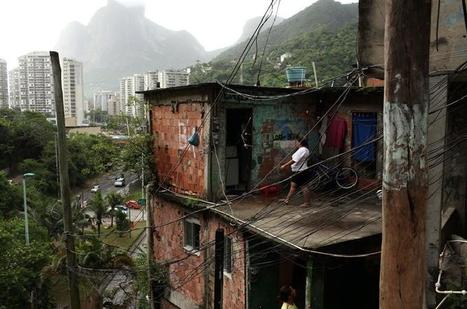



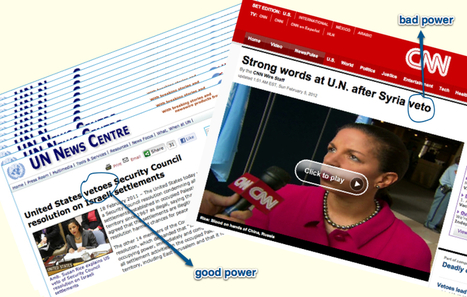






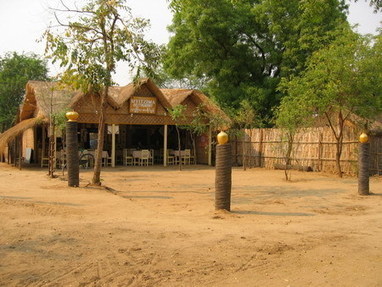

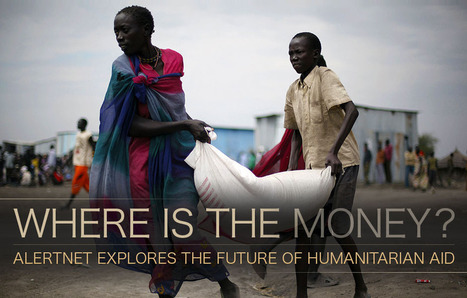


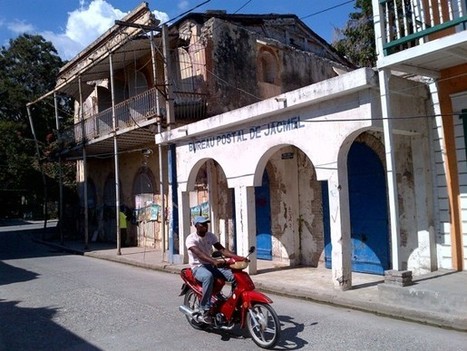










While I'm glad that they are dong something for their poor, it makes me wonder if they are only doing it for the upcoming world cup and olympics. I just wonder if they are trying to hide some of what really goes on there from tourists so they will think everything in brazil is all good.
FIFA 2014 is being hosted in Brazil. This article details the completely flawed and inhumane plan that Brazil has to get ready for the madness of FIFA. They seem to be too caught up in artificial aesthetic and have lost focus on development, while displacing thousands of poor Brazilians on the way.
With the world cup and summer Olympics being hosted in Brazil, the government are forcing people out of favelas to improve their image for tourists. What is frustrating about this is that bringing in a large sporting event like the Olympics and world cup actually looses money for the hosting country. So in their haste they are damaging the country twice over. First the government of Brazil is creating thousands of displaced and poor citizens, and on top of that they are spending valuable resources on preparing for a sporting event that will not turn a profit. What will happen after 2016, when you have a massive population of desperate homeless people migrating back to the favelas.